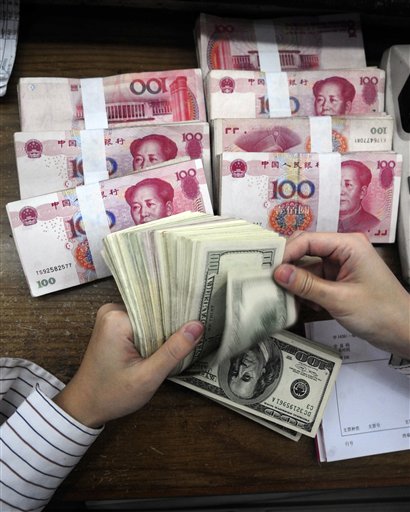 |
WASHINGTON (AP) — China retained its spot as the biggest foreign holder of U.S. Treasury debt in January even as it trimmed its holdings for a third straight month. The string of declines underscored worries that the U.S. government could face much higher interest rates to finance soaring budget deficits.
The Treasury Department said Monday that China’s holdings dipped by $5.8 billion to $889 billion in January compared with December. Japan, the second-largest foreign holder of U.S. government debt, also trimmed its holdings but by a much smaller $300 million, to $765.4 billion.
Net foreign purchases of long-term securities, a category that includes both government and corporate debt, totaled $19.1 billion in January, as net purchases of private corporate bonds fell by $24.8 billion, the biggest drop on record.
A month ago, Treasury initially reported that China had cut its holdings so sharply that it had lost its top spot as America’s largest foreign creditor, a position it had held since its holdings overtook Japan in September 2008.
However, 10 days later, Treasury released its annual update of the figures. The revised data showed that China, while reducing its holdings, still retained the top spot. Treasury revises the data based on more detailed readings of the statistics, which do a better job of sorting out actual ownership of the bonds. This review determined, for example, that some bonds credited to Britain because they were purchased there were actually purchased on behalf of Chinese investors.
The decline in Chinese holdings is coming at a time of increased tensions between the two nations. Chinese Premier Wen Jiabao on Sunday rejected American pressure on China to allow its currency to rise in value against the dollar, saying such efforts amounted to a kind of trade protectionism.
A group of 130 House members sent a letter to the administration on Monday urging the Treasury Department to cite China as a currency manipulator in a report that is scheduled to be released next month. The group also called on the Commerce Department to impose trade sanctions on China on the basis that its currency system was an unfair trade practice.
“If the administration fails to act on this issue it will hold back our economic recovery and hurt the ability of American small businesses and manufacturers to increase their production, keep their doors open and create jobs,” said Rep. Mike Michaud, D-Maine, one of the signers of the letter.
Treasury spokeswoman Natalie Wyeth said Treasury was still reviewing the congressional letter. She said there would be no direct response to Wen’s comments beyond President Barack Obama’s comments in a trade speech last week. Obama said that China would make an “essential contribution” to rebalancing the global economy by moving to a more market-oriented currency regime.
The Obama administration is hoping China will resume allowing its currency to rise in value against the dollar as a way of trimming the huge trade gap between the two nations. The United States ran a deficit of $226.8 billion with China last year, the largest deficit recorded with any country. A cheaper dollar would make American products less expensive in China while making Chinese goods more expensive for American consumers.
Treasury’s latest report on international capital flows showed that foreign holdings of Treasury securities increased by $17 billion in January to $3.71 trillion.
While China and Japan decreased their holdings, oil exporting countries boosted their holdings to $218.4 billion, up from $207.4 billion in December, and holdings of Treasury securities in Great Britain rose to $206 billion, up from $178.1 billion.
Rick McDonald, an economist at Action Economics, said the January report reflected a normalization of purchasing activities following a two-year credit crisis in which investors had flocked to the safety of U.S. securities in the wake of severe turmoil in global financial markets.
Julian Jessop, chief international economist at Capital Economics, said the Treasury report just affirmed market information in January that showed the dollar rising in value against most currencies with Treasury interest rates falling. Jessop said this pattern did not support concerns that foreigners were losing their appetite for U.S. bonds.
Strong foreign demand for U.S. Treasury debt helps to keep the interest rates that the government pays for that debt from rising. However, there are other factors that influence U.S. interest rates beyond foreign demand, including decisions by the Federal Reserve.
Fed policymakers have kept a key short-term interest rate at a record low of zero to 0.25 percent for more than a year and many economists believe that the Fed will continue to pledge to keep rates exceptionally low as a way to boost the economy when they conclude their regular meeting on Tuesday.
The federal budget deficit hit an all-time high of $1.4 trillion in 2009, and the Obama administration is projecting that this year’s deficit will climb even higher to $1.56 trillion. But the administration is also pledging to get the deficits under control once the economy has resumed sustained growth.
By MARTIN CRUTSINGER
March 16, 2010
Source: AP